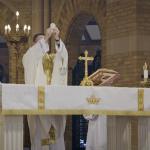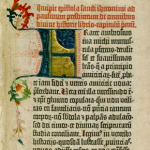During the early 1830’s a movement began in the Church of England known as the Oxford Movement. It was an attempt to reassert the Church’s claim to valid dogmatic authority and to reassess its relationship to the government. Ultimately the movement’s goal was to reclaim the Church’s prophetic role and its Catholicity (in the sense of universality). The Church of England, its members felt, was being turned into just another government agency. Bishops were being appointed who had no regard... Read more




















